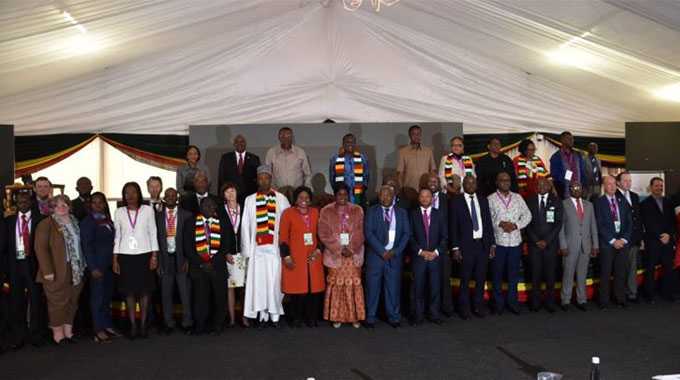Conservation farming a viable option

slo-wly drying for the coming of the harvest season.
Zimidzi, a smallholder farmer from Madamo-mbe Village in Chihota, under Chief Nenguwo, 67km south-east of Harare, expects a bumper harvest enough to feed his family for the rest of the year.
He is proud of his crop that towers above his head despite a mid season dry spell that affected crops for many other farmers in his area.
“Conservation farming is a trailblazer for ending hunger,” he told scores of farmers who had gathered at his homestead for a field day.
“Last year, I got two-and-a-half tonnes of maize and this year I am proud, I’m going to get three-and-a-half tonnes from this small communal plot.”
Crop yields in Chihota have been declining over the years owing to poor soil fertility, lack of access to agricultural inputs, erratic rains and labour shortages.
Most smallholder farmers still lack resources – draught power, seed, chemicals, technical know-how and labour to improve yields.
But for Zimidzi, once dependant of food aid from NGOs, has seen his life transformed by a simple farming technique called conservation farming.
“I had no draught power and other farm inputs. When Dr Joseph Mushonga taught me about conservation farming, my life changed. i am confident to spread this farming practice to others who lack the means to practice conventional agriculture,” Zimidzi says.
“As farmers, let’s take conservation farming seriously to help feed our families and stop promoting laziness by depending on food handouts from NGOs.”
This is just the second year Zimidzi has taken up conservation farming.
He has benefited immensely from Dr Musho-nga, a veteran Community Technology Development Trust plant breeder who is passionate about conservation agriculture.
He first introduced conservation agriculture to villagers in Chihota about two years ago as part of his desire to help resource-poor farmers to increase their crop yields.
Dr Mushonga trained five village heads and other farmers, who in turn also spread the word about conservation farming.
“When we started we were six,” says Moses Mumanyi-Samuriwo, the chairperson of Kuguta Kushanda Conservation Agriculture group.
“More and more people are becoming interested in conservation farming. We now have 43 members. People are realising the benefits of conservation farming. Those who have taken up conservation farming are seeing the benefits much more than those using conventional agriculture.”
This low-cost, sustainable and environment-friendly technology, he says, is helping to boost the confidence and self-reliance of farmers in Chihota which is increasingly being hit by droughts.
“We still have carry-over harvest from last year up to now. We no longer have to buy maize from other areas to survive. We are self-reliant and we need more support to help practice conservation farming more successfully,” he says.
“We want to spread this farming practice all over Chihota. I’m optimistic about the future of conservation agriculture in our area. I’m very grateful for all the support and wisdom we got from Dr Mushonga.”
Since its adoption, conservation farming has increased crop yields tremendously and the system has been widely adopted not only in donor-funded project sites but country wide as a sustainable farming practice.
The Government made it a policy for all communal resource-constrained farmers to practise conservation farming to improve their household food security. This farming system has become an important practice to help smallholder farmers improve food security and cope with drought.
In many parts of Africa, food insecurity is increasing and conservation agriculture can help reduce food insecurity particularly in rural areas where agriculture is the main economic activity.
Dr Mushonga says this farming practice helps conserve soil moisture at the same time impro-ving soil fertility. He says it is a low input technology and it helps crops adapt to changing climatic conditions.
Some of the benefits of conservation agriculture, he says, include:
l Minimal soil disturbance – (instead of ploughing the entire field individual planting holes are prepared by hoe.
l Use of mulch such as grass, leaves, crop residue and manure conserve moisture and enhance soil fertility.
l Diversified crop rotations and intercropping help improve soil structure and minimise pest outbreaks
l With timely land preparation and weeding farmers can get yields even if there is a drought.
Studies in recent years, Dr Mushonga says, have shown that yields in fields farmed by conservation methods have increased significantly far out-performing areas under conventional farming practices. The findings, he says, in general confirm that conservation farming produces on average more maize per hectare than conventional farming.
In addition, he says, the techniques used in conservation farming use less fertiliser and other chemicals which are expensive and not easily accessible for the majority of smallholder farmers. Conservation agriculture, he says, minimises farmers’ dependence on expensive technologies and inputs (chemical fertilisers and pesticides, expensive seeds, including genetically modified ones).
Even though its labour-intensive, he says, it helps farmers to make the best possible use of local resources like leaves, crop residue and cow dung to provide nourishment to their crops and to protect them from pests and diseases.
“At every stage, soil and water conservation is emphasised. Soil erosion caused by water and wind is checked, collection and growth of traditional seeds is stressed,” Dr Mushonga said.
As a result, input costs have dramatically decreased. Farmers reported that their costs had dropped to negligible levels.
At the same time, thanks to better nourishment and protection of the soil, yield levels have increased, leading to improved household food security.
“Farmers now do not need to depend on donors for seed, fertilisers and food to survive,” said Uritah Muzanenhamo, a farmer from Muzanenhamo village in Chihota.
“My conservation farming crop is impressive this year. I’m happy about this farming method. We must spread the word.”
She is expecting to harvest 15 bags of maize up from just three she got from using conventional farming techniques.
Farmers in Chihota have become better organised making it easier for them to take up conservation farming to enhance their livelihoods.
Through their farming groups they plan to resist exploitation and mobilise for better marketing efforts that help them obtain better prices for their produce. They have set up self-help groups to train new members on conservation agriculture without any donor support.
Zimidzi’s first experiments with this technique proved so successful that he has become an enthusiastic exponent of the technique. At the field day, farmers talked animatedly about the improved viability of their smallholder plots owing to the introduction of conservation farming techniques.
Farmers are regaining their confidence and want to continue farming. On the other hand, farmers in Chihota want more support to enable them to market their produce.
The commodity marketing is many-sided and complex. Cheap imports, depressed prices and weak agricultural marketing interventions are a big problem. The dollar sign is critical to keep farmers on the field.
Conservation agriculture brings numerous benefits – conservation of soil, water, and soil organic matter resources and reduction of costly inputs while maintaining or improving crop yields and profits.
While large agro-chemical companies have an appetite to promote conventional agriculture to boost their profits, conservation farming remai-ns a viable option for resource-poor farmers keen to free themselves from the malignancy of poverty.
“For farmers in Chihota, conservation agriculture is now a rallying point to fight for the common goal to end hunger and poverty.
“Let us desist from using zvikwambo or zvitokwane and disabuse ourself from labelling farmers who succeed through hard work kuti vanoshandisa mushonga,” says Dr Mushonga.
“Hard work, willingness to learn and good timing are critical for one to succeed in farming. Zimidzi’s willingness to embrace this farming technique has transformed his life. Njere moto unotogokwa kune vamwe.”








Comments